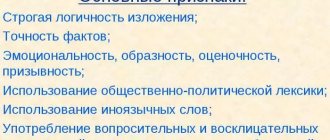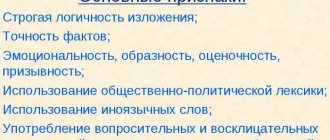Updated July 23, 2021 Author: Dmitry Ivanetscu
Hello, dear readers of the KtoNaNovenkogo.ru blog. Each of us has a general idea of what speech is. However, there are significant differences in the understanding of this word by different people.
Even in dictionary interpretations, this phenomenon is referred to either as the activity of the speaker, or as a form of communication, or in general as a person’s psychological ability to express thoughts.
Today we’ll talk about how linguists understand speech, what types and functions they distinguish. Finally, let's figure out what the border is between language and speech.
Speech is...
In the scientific world there is rarely a unified meaning for such voluminous concepts as speech. However, the interpretation of Nina Davidovna Arutyunova, one of the most famous linguists of our time, is recognized by the majority of linguists. It sounds like this:
Speech is specific speaking that occurs in audio (including internal pronunciation) or written form.
In Ushakov’s Explanatory Dictionary, the first meaning is given as follows:
Speech is the ability to use the language of words. Speech is one of the characteristics that distinguishes humans from animals.
Both are true. But from the point of view of the science of language (and the logic of naming), N.D. Arutyunova’s definition will be primary. In the dictionary entry, she indicates that speech should be understood :
- speech activity as the process of speaking;
- speech productions (memorized or recorded) as a result of this process.
Other meanings of the term are derivative. For example, there is an understanding of speech as a style of language (artistic, business), as a public speech (greeting), as the nature of pronunciation (unintelligible).
Common mistakes students make when preparing a speech
Writing a report for presentation before the certification commission is a responsible task. In the speech, the research author must combine the most important information from the thesis project in order to prove the effectiveness of his work. There are several mistakes that are often made when creating a speech. These include:
- lack of a clear narrative structure and, as a consequence, logic;
- a large amount of “water” in the text, which does not carry any semantic load, but takes up space and limited time;
- focusing on only one aspect of the problem and limited description of the others;
- too lengthy description;
- an excess of complex scientific terms in the text, especially if their use can be avoided without damaging the content of the speech.
Another common mistake is the use of the pronoun “I” in speech (“I came to a conclusion”, “I propose the following ways to solve the problem”). The student presenting the thesis project should say “we” instead of “I.” Thus, he emphasizes that the work was done together with the scientific director of the project.
Types of speech
Even in elementary school, we learn that speech can be oral and written . But for linguistics this distribution is not enough.
It is customary to distinguish types of speech according to three main characteristics. Depending on these grounds, the basic classifications presented below have been formed.
By type of communication means used
Depending on how a person expresses his thoughts, speech is divided into the following types:
- Verbal . The main means of communication is the word (lat. Verbum).
- Nonverbal speech. Body language (facial expressions, gestures) and extralinguistic techniques (intonation, use of pauses, volume changes) are used.
- Oral . Involves speaking in audible form and understanding what is said by ear. Requires direct contact or mediation through a technical means (telephone, audio recording...).
- Written. Communication using a system of symbols that are depicted on a material medium.
- Kinetic . Transmitting thoughts using a system of signs that are associated with different finger configurations. This is the main way for communication between people deprived of the ability to hear and speak.
- Iconic. Based on the use of other semiotic systems - more specific ones. Example - emoticons, Morse code, code of signals in the navy.
It is obvious that in each specific speaking different types of speech intersect, since they are not in opposition to each other.
The most stable “ combo ” is oral + verbal + non-verbal speech, since in conversation we use words, facial expressions, and gestures.
Written speech is also verbal, but the nonverbal component in it is often reduced to zero.
An example of writing a defensive speech for a coursework
To write a good speech for your term paper, pay attention to the sample below.
Good afternoon, dear members of the certification commission!
Subject
my course work - Crime and its signs.
The relevance of this topic is due to the fact that the concept of crime is the most key category of criminal law. In order to implement the tasks facing criminal law to protect the interests protected by criminal law, a clear definition of the concept of crime is required. Indeed, without it it is impossible to imagine what the science of criminal law would be like, because with its help there is an answer to what acts can be called illegal, what conditions must be in order to recognize an act as a crime, and the person who committed this act as a criminal, what criminal actions more dangerous to society, some less. This concept serves as a support for the legislator when establishing punishments for types of crimes.
Target
This work is to define the concept and study in detail the definition of crime, explore the forms and similarities of the concepts of crime and other offenses, and distinguish in detail between these concepts.
The first chapter examines the concept of crime and its signs. Also, this concept as a legislative structure and legal category has gone through quite a long path in its development, which can be divided into certain stages.
The second chapter talks about the categorization of crimes in the Russian Federation. The 4 main categories of crimes are also carefully analyzed and each category is assessed.
In the third chapter, I studied the differences between crimes and other immoral offenses. Distinguishing the concept of crime from other criminal acts is a very important part of the study.
Conclusion, the purpose of the work - to formulate the concept and reveal the definition of a crime, to study the form and similarity of the definition of a crime and other offenses, to analyze the differences between these definitions and to study the problems of this concept - was achieved, all the tasks assigned to me were successfully solved.
Thank you for your attention! The report is finished.
Types of speech based on discontinuity and continuity
- Dialogical speech is realized during the communication of several interlocutors (two or more). It is discontinuous, as it implies a direct reaction, the inclusion of comments, evaluations, and additions.
- Monologue However, it is implemented by one speaker, it does not have pauses for the inclusion of remarks from the interlocutors.
These types can be actualized both in oral and written communication.
By type of social processes
The definition emphasized that internal enunciation is a form of speech along with voicing. Therefore, the following classification is relevant:
- External . Aimed at communication between people.
- Internal . It is updated in a person’s consciousness or unconsciously.
Speech and thinking are directly related. The process of transforming thoughts into words and words into thoughts is based on the phenomenon of inner speech .
It is necessary to describe specific speaking taking into account all classifications. For example, the correspondence of two VK friends is external, dialogic, verbal, non-verbal sign (if emoticons are used) speech.
Sample of an ideal speech for defending a coursework
- To increase your chances of an excellent defense of your coursework, include visual illustrations in your work; they are not difficult to do. Visual illustrations in the form of a presentation will interest the certification commission, and your report will be better perceived. This will help form a positive impression on the commission.
- After your report is completed, you will have to answer questions from the certification committee. Don’t be afraid of questions; if the public has them, that’s good. It means that they listened carefully to your work and were interested in it, so questions arose. Work through potential questions and answers in advance. If you think through your answers in advance, you will feel more confident.
Speech for the defense of the course work.
- When your speech for your course work is ready, you should definitely arrange a rehearsal and speak in front of one of your friends. Try letting them read your report, maybe they can point out any mistakes. Try to avoid introductory words in your report, and if there are, remove them. Check your text several times. The main problems arise due to the fact that the student is nervous and cannot clearly express his thoughts.
- When your report is finished, a good conclusion would be to successfully answer all the questions and thank the certification committee for their attention. Decisions on evaluating your work will be made by the entire certification commission, so try to please all its members. Your address to the commission members should be very polite.
Functions of speech
There are 4 main functions of speech:
- Communicative . Associated with communication between people and the transfer of information. It has internal divisions shown below.
- Cognitive. It is the main mechanism for accumulating human knowledge and transferring it to new generations.
- Psychodiagnostic . By observing the speaking process, the interlocutor understands the state of the speaker and can create a portrait of his personality.
- Psychotherapeutic. Involves the ability to verbally support another person.
The communicative function has 4 aspects (what is it?):
- Organizational . Conversation is used to agree on common actions.
- Expressive. An antisocial state and reaction are expressed and emphasis is placed.
- Incentive . Implies a request, order, persuasion.
- Marking . A person’s characterization of everything that surrounds him, for orientation in space, for the transfer of experience or his assessment to others.
How to prepare for your thesis defense psychologically
The upcoming defense of a diploma causes anxiety and anxiety for everyone, including the most reserved graduates. Stress can negatively affect the quality of a performance, even if one is well prepared for it.
Psychologists recommend that all students who are about to defend their thesis project remain calm. The following tips will be useful for them:
- You can’t exhaust yourself with worries the day before. If everything has already been tested and rehearsed, try to distract yourself with a hobby.
- If you're worried about how you'll look in defense, practice your performance and videotape it. By reviewing the recording, you will be able to identify errors and omissions and promptly correct them.
- Under no circumstances should you think that you will not be able to defend your diploma. This only makes the experience worse.
For those who are worried about defense, this checklist will also be useful. Test yourself!
- The speech fits into the time allotted for the speech.
- The structure of the report text includes all the necessary structural elements.
- The main points or the full text of the speech are printed out, and you can count on them as little cheat sheets for your speech.
- The text of the speech is coordinated with the presentation.
- The report has been rehearsed.
You should not think that the main task of the commission members is to ensure the failure of your defense. If you know the material and can easily talk about your work and its results, then you can fully count on a loyal attitude and a good assessment.
If you have to defend your thesis within the walls of a college, we recommend that you read the article of the same name.
How to start a report at the defense of the thesis
The defense speech begins with a greeting to the commission. You can say this: “Dear members of the State Attestation Commission! I present my final work on the topic: “Financial results of the activities of the enterprise CJSC Drilling Equipment Plant.”
Then comes the introduction, which should be devoted to just a few sentences.
Approximate plan for a report on the defense of the scientific research project
There are several points that must be adhered to:
- introduction, introduction to the topic and explanation of the relevance of the topic is taken from the introduction of the project;
- familiarization with the structure of the WRC - how many chapters, what the sections are devoted to;
- the theoretical part - to identify the sources that were used in the process of writing the thesis project, methods, analysis of the problem;
- a practical chapter devoted to calculations and expectations from work;
- research results - conclusions can be duplicated from the conclusion of the WRC.
WE OFFER A FULL RANGE OF SERVICES FOR STUDENTS:
Send a request for calculation: This email address is being protected from spambots. You must have JavaScript enabled to view it. Call: 8-800-100-6787 (Free in the Russian Federation!) |
Russian language is the language of the Russian people
The Russian people are one of the most ancient peoples of humanity, which has gone through centuries of history.
With the development of society, language was formed and strengthened. Russian was the native language for such great people as Prince Vladimir of Kiev, Mikhail Lomonosov, Alexander Pushkin, Sergei Yesenin and others.
The Russian language is in great demand in the modern world. Among the languages of the world, it occupies one of the first places.
The Russian language takes its roots from related Indo-European languages, which descend from the Indo-European proto-language. It was native to the ancestors of various peoples who lived in Europe and Asia.
Russian is the official language of the Russian state. It is also a means of interethnic communication, since people of different nationalities live on the territory of the Russian Federation. Moreover, it is the second native language for the countries of Ukraine, Belarus and some others. It is very difficult for foreigners to study, since they cannot understand and master many of its features.
This language is beautiful, multifaceted, and famous for its rich vocabulary. The greatest works of Russian literature were created on it.
What is important when writing a coursework report?
The most important thing is to navigate in time. Most often, about 7-10 minutes are allotted for protection. During this time, you need to present all the important material. The volume of the report should not exceed three A4 pages. You need to express your thoughts clearly, concisely, and consistently. A lengthy, rambling presentation can cause teachers to become bored and want to end the story prematurely, which will definitely lower your grade. To prevent this from happening, follow a structure that consists of an introduction, a theoretical part, main material and a conclusion. Let's look at each element in more detail.
Features of the relationship between language and speech
The distinction between these two concepts was introduced by Ferdinand de Saussure. At the same time, we should not forget the main difference between language and speech. And it consists in the fact that the first is a means of communication, and the second, in turn, is the embodiment and implementation of the language itself.
Language is considered to be abstract and formal, and speech is considered material. It is in it that everything that is in the language is corrected. It is stable and static, while speech is active and dynamic, characterized by higher variability.
Language and speech, despite the fact that they are interconnected, have clear distinctions: language is the property of society, it reflects the general “picture of the world” of the people speaking it, speech is individual and reflects only the experience of an individual person.
Language does not depend on the situation and directly on the communication environment, and speech, in turn, is contextually and situationally determined.
Hello
As a greeting, it is always better to use the phrase “Good afternoon” rather than the word “hello”, as many are used to, especially if you belong to a business environment, because “hello” is, in fact, a wish for health.
Article on the topic
Conversational etiquette. 10 questions that well-mannered people don’t ask Previously, etiquette rules for high society did not imply the importance of physical health. It was significant to a greater extent for the peasants, because if it is not there, you simply will not feed yourself. Among the nobility, when someone said “hello,” the person immediately asked the question: “Do I look so bad that they wish me health?”
Of course, you can say “hello” to close people whom you know well, but, again, it is better to replace this word with a more universal greeting: “good morning” before 12:00, after 16:00 - “good evening”. If you are at work, you can say “good afternoon” to your colleagues even after 16:00, because while we are in the office, our head is definitely busy with business, and not with what time it is.









